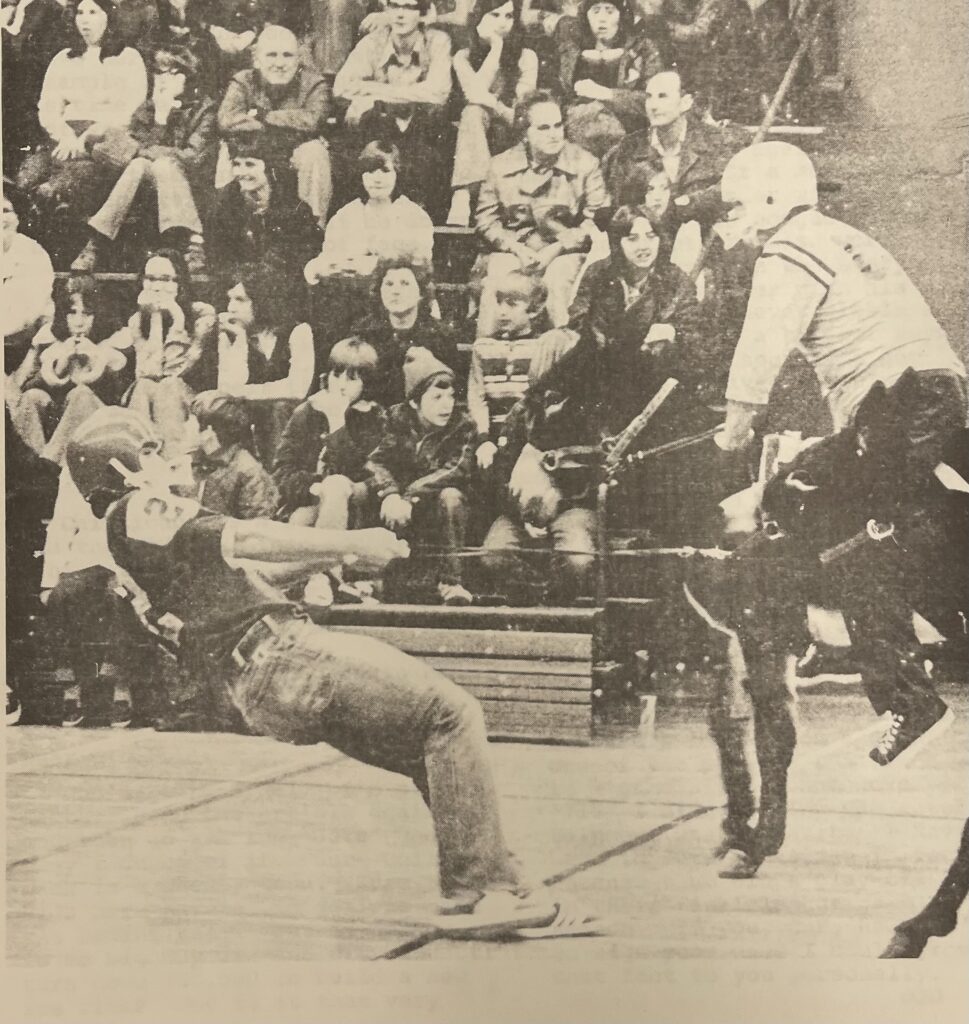Dr. Sheila Thompson, in a speech to the Chilliwack Rotarians on the generation gap in May of 1970, said, “School spirit has vanished from the scene and there is no way you can replace it.”[1] She argued that this was because of a loss of the Protestant work ethic and the lack of understanding between generations.[2] This statement and analysis was common from the older generations in Chilliwack at the time; there was a serious concern about the lack of student involvement and school spirit. While it could well be argued that this concern was simply a generational thing, that the older generations simply felt that the attitude towards school and its purpose was different among the teenagers; however, the complaint that there was a loss of school spirit came from students too. For example, Kelly Doyle, a student a CSSS, bemoaned that “student apathy was more pronounced than usual.”[3] The reality is, the complaint that school involvement and spirit was disappearing was not that well founded, while it might have been slightly disappearing compared to what it used to be, it is also true that school involvement and spirit was simply shifting elsewhere.

The student council was one example of a way that students were quite involved in CSSS. The student council was elected by the student body, and they did have a certain amount of power delegated to them by the school administration. Students are quite opinionated on the role of the student council and what it should be, but it is also an engine that students could use to get what they wanted at school. Students were never afraid to be critical of the student council, but even more often they were critical of its limits in power delegated to them by the administration.[4] Students at CSSS lauded the achievements of the student council, such as legalizing smoking in the quadraqual or the quad, an area outside on school property where students gathered.[5] The student council was an institution that many students were actually quite engaged with.
The student council did generate a lot of controversy in the school year of 1968 to 1969 as the student council fell apart. The first student president in that year, Ron Eckert, was forced to resign because his marks were not good enough.[6] Then the speaker and the secretary also left, the speaker resigning and the secretary being deposed by the student body.[7] So, new people were elected to the student council, but the president, Al Mooney that was elected, hardly held onto his office as the student body unsuccessfully attempted to impeach him.[8] Then, to add to the chaos, when the student council allowed the student assembly to elect someone president for the day in place of Art Mooney, they elected Ron Eckert, the same president who had been kicked out for low marks.[9] This is all very entertaining, and it simply shows how engaged the students were in electing their student council. Even more so, it demonstrates a sense of rebellion and resentment towards authority; by elected Ron president for the day, it was a stab at the teachers who had forced him to resign. Of course, not all students were engaged in this, but it was considered, by teachers and students alike, to be an important part of the school.
School spirit to the teenagers of the 1960s and 1970s did not necessarily mean being dedicated to one’s school just because that’s the way it was supposed to be. Students had school spirit in that they wanted to change the way the school was run. They had spirit for the changes they wanted to see, and this school spirit was more seen as rebellion from teachers than any form of spirit. One example of this was the semester system, this was one debate with some students wanting change and others preferring the system. Students, generally speaking, were concerned about having more independence and less control from their parents and teachers. While to the teachers, this was a problem and a reason for less school spirit, but the students had passion for having more independence in the school with less control and less rules.
Club rallies were also events designed to bolster school spirit; however, they did not always get the greatest turn out. One student who advocated the importance of club rallies made the case that students should not complain about school if they are not willing to participate: “instead of sitting around complaining that school is such a drag, why not find something that interests you and join it?”[10] However, while some students advocated for more school involvement, most students wanted more independence and freedom from adult control. For example, the school sent out a paper telling the students how they should sing the school song; the students responded by describing the paper as “that propagandist piece of paper.”[11] The students were not impressed with the school’s “fascist methods of arousing school spirit.”[12] The students did not want the school telling them to support the school in certain ways; they did not want the teachers controlling the way they supported their school; they wanted independence and their own way of doing things. So, while the school and the adults saw this as a disappearance of school passion and spirit, it was rather a change of attitude towards authority and school; the passion and spirit were still there but directed elsewhere.
So, school spirit and involvement were decreasing in the way that school spirit used to be, but it was not decreasing in that the involvement was still there in many ways, and the passion and spirit were simply directed elsewhere to issues students cared about. While some students still preferred the old forms of school spirit, others redirected their spirit. They wanted more freedom from the rules of school, which was seen as rebellion, not spirit.
[1] “Generation Gap Greater Than Ever Dr. Sheila Thompson Tells Rotarians,” Chilliwack Progress, “May 20, 1970,” 15, https://theprogress.newspapers.com/image/77069673/.
[2] “Generation Gap Greater Than Ever,” Chilliwack Progress, 15.
[3] Frontiersman, Chilliwack Senior Secondary School, 1969-1970.
[4] K.G., “Student Council- Token or Power,” Tatler, Chilliwack Senior Secondary School, October 15, 1971, 5.
[5] Frontiersman, Chilliwack Senior Secondary School, 1968-1969.
[6] Frontiersman, Chilliwack Senior Secondary School, 1968-1969.
[7] Frontiersman, Chilliwack Senior Secondary School, 1968-1969.
[8] Frontiersman, Chilliwack Senior Secondary School, 1968-1969.
[9] Frontiersman, Chilliwack Senior Secondary School, 1968-1969.
[10] Kathie Goggin, “Club Rally,” Tatler, Chilliwack Senior Secondary School, October 8, 1971, 9.
[11] Kathie Goggin, “Editorial,” Tatler, Chilliwack Senior Secondary School, October 22, 1971, 1.
[12] Kathie Goggin, “Editorial,” Tatler, Chilliwack Senior Secondary School, October 22, 1971, 1.
